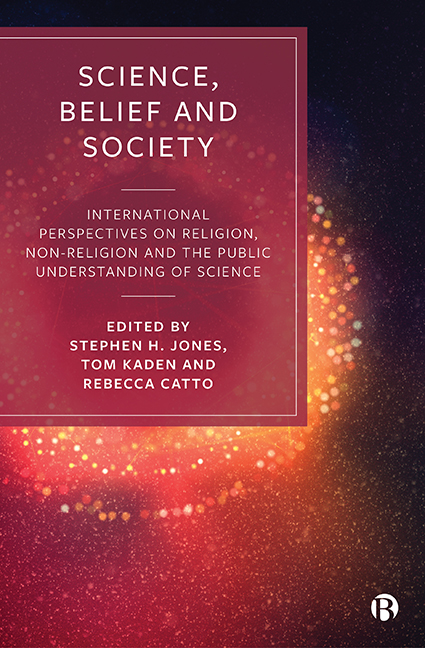 Science, Belief and Society
Science, Belief and Society Published online by Cambridge University Press: 27 April 2022
Science, belief and sociology
Summarizing the sociological study of science and religion a little over 10 years ago, John H. Evans and Michael S. Evans (2008: 88) wrote:
Although we know of no study of the comparative coherence of sociological research areas, we suspect that the field of religion and science is one of the muddiest in all of sociology. The conceptual source of this muddiness lies in the long-running academic assumption that religion and science always conflict and that they conflict over competing truth claims about the world. It is therefore hard for sociologists to analyze the relationship dispassionately because sociology itself was born as a scientific alternative to religion.
While, as we will see shortly, there have been notable developments since this was written, Evans and Evans's point still stands. Sociological exploration of questions to do with science and religion (or, as we prefer to phrase it, science and belief) is extremely limited and scattered across largely isolated sub-disciplines. Beyond the US (where most research has focused), it would be hard to even describe it as a ‘field of study’, so limited and disjointed has research been to date. This is surprising in many ways because science and religion has been an abiding subject of public debate for many decades in many parts of the world, and there are numerous ways in which it intersects with sociologists’ concerns. Religious voices play a prominent role in many conflicts over science, from stem cell research to, most famously, evolution. There has also been a trend towards religious groups – from evangelicals (Toumey, 1994) to Muslim revivalists (Unsworth, Chapter 12, this volume), to Hindu nationalists (Thomas, Chapter 6, this volume) – justifying their beliefs by making a claim on science (von Stuckrad, 2014). At the same time, science has been deeply entangled in debates about secularization; many non-religious people see science as central to their identity (Lee, Chapter 8, this volume), while humanist and secularist organizations have regularly characterized themselves as ‘fighting in the name of science’ (Kind, Chapter 9, this volume). Yet, this subject has been on the margins of sociology for many years.
It is hard to understand why this is without, as Evans and Evans say, taking into account the influence of what historians refer to as the ‘conflict thesis’.
To save this book to your Kindle, first ensure no-reply@cambridge.org is added to your Approved Personal Document E-mail List under your Personal Document Settings on the Manage Your Content and Devices page of your Amazon account. Then enter the ‘name’ part of your Kindle email address below. Find out more about saving to your Kindle.
Note you can select to save to either the @free.kindle.com or @kindle.com variations. ‘@free.kindle.com’ emails are free but can only be saved to your device when it is connected to wi-fi. ‘@kindle.com’ emails can be delivered even when you are not connected to wi-fi, but note that service fees apply.
Find out more about the Kindle Personal Document Service.
To save content items to your account, please confirm that you agree to abide by our usage policies. If this is the first time you use this feature, you will be asked to authorise Cambridge Core to connect with your account. Find out more about saving content to Dropbox.
To save content items to your account, please confirm that you agree to abide by our usage policies. If this is the first time you use this feature, you will be asked to authorise Cambridge Core to connect with your account. Find out more about saving content to Google Drive.